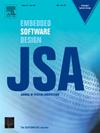A survey of optimization algorithms for differential privacy in Federated Learning
IF 4.1
2区 计算机科学
Q1 COMPUTER SCIENCE, HARDWARE & ARCHITECTURE
引用次数: 0
Abstract
Federated Learning (FL), as a distributed machine learning approach, enables joint model training without sharing raw data, but during the model update process, the transmission of information still poses potential risks that may lead to the leakage of user privacy. In recent years, differential privacy (DP) techniques have been widely applied to federated learning to enhance data privacy protection. However, the introduction of differential privacy often has a negative impact on model performance, such as reducing model accuracy and increasing training time. Therefore, how to effectively balance privacy protection and model performance in federated learning has become an urgent problem to address. This paper first introduces the basic principles of federated learning and differential privacy, and then focuses on reviewing optimization algorithms for Differential Privacy in Federated Learning (DPFL). Unlike existing reviews on DPFL, we categorize the optimization algorithms into three types: noise mechanism optimization, privacy budget management, and model update optimization. By referencing a large number of related studies, we elaborate on the basic ideas, key innovations, and other aspects of various optimization methods, showcasing their performance and advantages in balancing privacy protection and model performance. Finally, we provide an outlook on future research directions, including further integrating DPFL with other advanced technologies to provide stronger support for applications in complex scenarios, enhancing visualization, and exploring the application of DPFL optimization algorithms in more practical fields.
联邦学习中差分隐私优化算法综述
联邦学习(FL)作为一种分布式机器学习方法,可以在不共享原始数据的情况下进行联合模型训练,但在模型更新过程中,信息的传递仍然存在潜在的风险,可能导致用户隐私的泄露。近年来,差分隐私(DP)技术被广泛应用于联邦学习,以增强数据隐私保护。然而,差分隐私的引入通常会对模型性能产生负面影响,例如降低模型准确性和增加训练时间。因此,在联邦学习中如何有效地平衡隐私保护和模型性能成为一个迫切需要解决的问题。本文首先介绍了联邦学习和差分隐私的基本原理,然后重点介绍了联邦学习中差分隐私的优化算法。与现有的DPFL研究不同,本文将优化算法分为噪声机制优化、隐私预算管理和模型更新优化三种。通过参考大量相关研究,阐述了各种优化方法的基本思路、关键创新点等方面,展示了它们在平衡隐私保护和模型性能方面的性能和优势。最后,展望了未来的研究方向,包括进一步将DPFL与其他先进技术相结合,为复杂场景下的应用提供更强的支持,增强可视化,探索DPFL优化算法在更多实际领域的应用。
本文章由计算机程序翻译,如有差异,请以英文原文为准。
求助全文
约1分钟内获得全文
求助全文
来源期刊

Journal of Systems Architecture
工程技术-计算机:硬件
CiteScore
8.70
自引率
15.60%
发文量
226
审稿时长
46 days
期刊介绍:
The Journal of Systems Architecture: Embedded Software Design (JSA) is a journal covering all design and architectural aspects related to embedded systems and software. It ranges from the microarchitecture level via the system software level up to the application-specific architecture level. Aspects such as real-time systems, operating systems, FPGA programming, programming languages, communications (limited to analysis and the software stack), mobile systems, parallel and distributed architectures as well as additional subjects in the computer and system architecture area will fall within the scope of this journal. Technology will not be a main focus, but its use and relevance to particular designs will be. Case studies are welcome but must contribute more than just a design for a particular piece of software.
Design automation of such systems including methodologies, techniques and tools for their design as well as novel designs of software components fall within the scope of this journal. Novel applications that use embedded systems are also central in this journal. While hardware is not a part of this journal hardware/software co-design methods that consider interplay between software and hardware components with and emphasis on software are also relevant here.
 求助内容:
求助内容: 应助结果提醒方式:
应助结果提醒方式:


